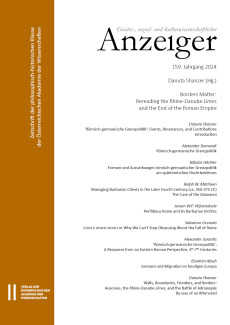Geistes-, sozial- und kulturwissenschaftlicher Anzeiger ‒ Zeitschrift der philosophisch-historischen Klasse der Österreichischen Akademie der Wissenschaften, 159. Jahrgang (2024)
Borders Matter: Rereading the Rhine-Danube Limes and the End of the Roman Empire
Gastherausgeber: Danuta Shanzer, Herausgegeben von Österreichische Akademie der Wissenschaften
Reihe: Geistes-, sozial-und kulturhistiorischer Anzeiger (vormals nur "Anzeiger) der ÖAWThis issue reacts to Alexander Demandt’s fast-paced account of the rise and eventual fall of the Western Roman Empire, a topic of periodically hot political interest. His focus: Germanic barbarians and the Rhine-Danube limes, invasion, conflict, change, and loss (from the Empire’s perspective). The international contributors, primarily ancient historians and adherents of a more peaceable “transformation school,” respond and refine. The volume offers a study of client kingship as a strategy for making the Alamanni “us” rather than “them”. Next, one of the comparatively neglected Upper Rhine limes, following its less dramatic history as a zone of mixed ethnicities, settled by barbarian foederati that eventually became the Second Burgundian Kingdom of the early Middle Ages. An ancient stereotype is re-examined, and Romans may emerge as even more perfidious than barbarians. The joys and perils of narrative history are discussed, and a view from the Eastern Frontier shows how it differed, and why it held, despite raiding. Included are reflections on literary depictions of boundaries and borders, ancient demography, and the role of Christianity as well as a second look at the Rhine-Danube limes through the eyes of the poet and politician Ausonius, who came home from the Rhine limes and also acted as Gratian’s spin-doctor after Adrianople in 378. Migration into Europe casts its shadow over contemporary Roman historiography, and the CDU leadership in Germany tried (unsuccessfully) to suppress an earlier version of Demandt’s contribution in 2015. The volume thus includes a substantial piece on l”affaire Demandt from a modern legal scholar with expertise in Islam. The direct applicability of Roman concerns to present politics is limited, but modern conditions, will to integration, and the respective expectations of host countries and immigrant communities may augur more difficult transformations for modern Europe than for the Western Roman Empire.

